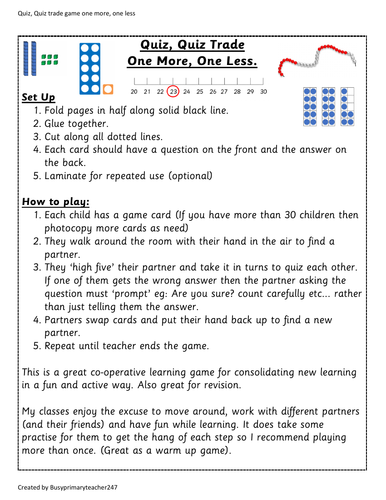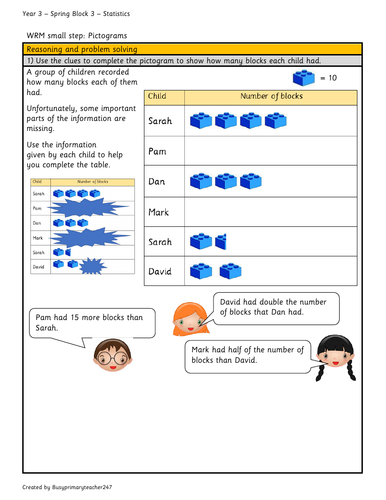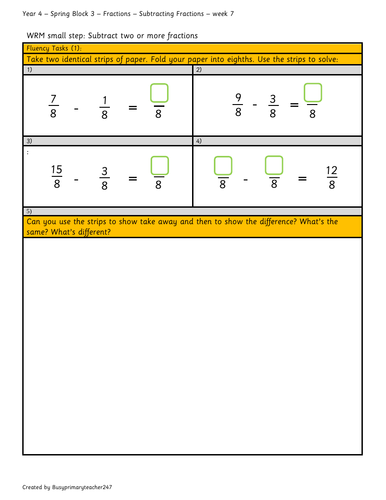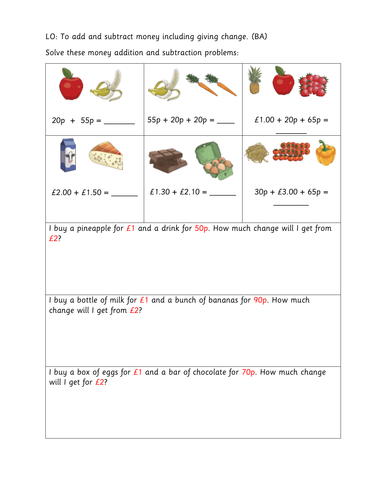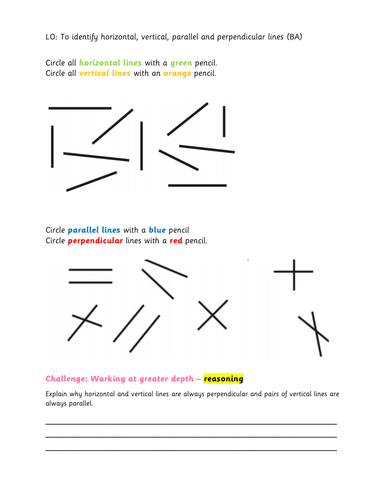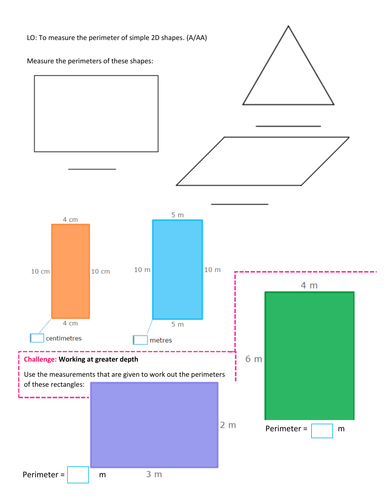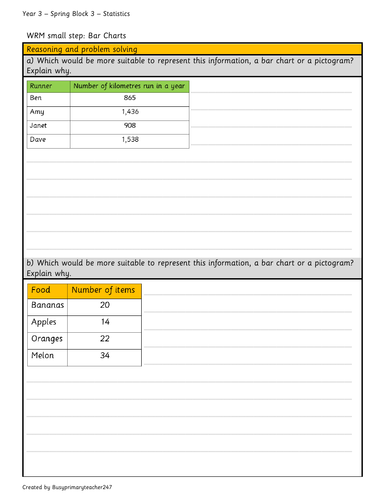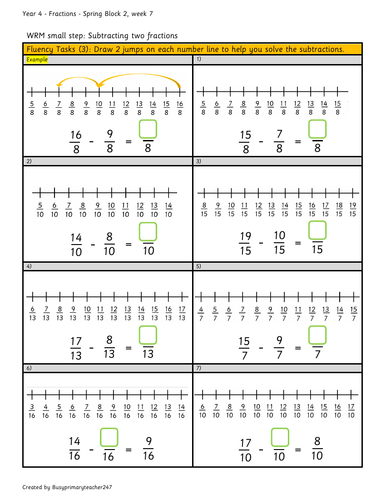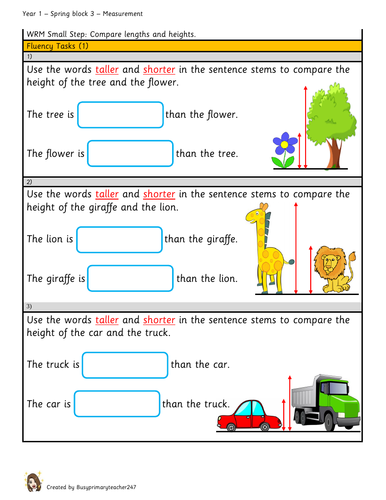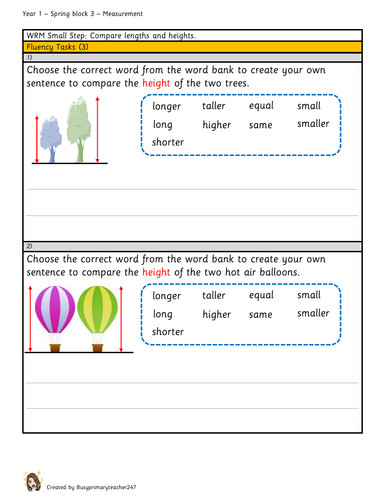132Uploads
175k+Views
66k+Downloads
All resources

Quiz, Quiz, Trade Cooperative Learning activity based on finding one more and one less (up to 50)
This is a fun and engaging way for children to learn about finding one more and one less (using numbers up to 50) through a cooperative learning activity called Quiz, Quiz, Trade.
This activity can be used as a warm-up or plenary and doesn't require too much preparation (If you choose to laminate it you can use it multiple times).
Enjoy x
Instructions are included in the resource.

Year 4 - Spring Block 3 -fractions (week 6)
WRM Small Steps
Fractions greater than one
Add two or more fractions
Count in fractions
Curriculum links:
Recognise and show, using diagrams, families of common equivalent fractions.
-Count up and down in hundredths; recognise that hundredths arise when dividing an object by one hundred and dividing tenths by ten.
-Solve problems involving increasingly harder fractions to calculate quantities, and fractions to divide quantities, including non-unit fractions where the answer is a whole number.
-Add and subtract fractions with the same denominator.
I hope you find this resource useful,
Your feedback is always welcome :)

Year 3 - interpreting pictograms (2)
This resources enables children to read and interpret information from pictograms, make comparisons and ask questions about data. It includes worksheets linked to WRM fluency tasks 1 & 2 and reasoning questions.
WRM Small Step: pictograms
Curriculum links:
-Interpret and present data using bar charts, pictograms and tables.
-Solve one-step and two-step questions [for example, ‘How many more?’ and ‘How many fewer?’ using information presented in scaled bar charts and pictograms and tables.
Enjoy!
Your feedback is always welcome x

Statistics - Bar Charts (edited)
This resource contains varied fluency questions, reasoning and a challenge question. Differentiated 2 ways and includes answers. Linked to Year 3 Spring block 3. Statistics - WRM Small Step - bar charts.
Curriculum links
Interpret and present data using bar charts, pictograms and tables.
Solve one-step and two-step questions [for example, ‘How many more?’ and ‘How many fewer?’] using information presented
in scaled bar charts and pictograms and tables.

Place Value - Ordering Numbers Within 50
This resource links with Year 1, Spring Block 2, Number: Place Value (within 50) and uses a concrete - pictorial -abstract method to support the teaching of ordering numbers within 50. It also includes answers.
Curriculum Links
-Count to 50 forwards and backwards, beginning with 0 or 1, or from any number.
-Count, read and write numbers to 50 in numerals.
-Identify and represent numbers using objects and pictorial representations including the number line, and use the language
of: equal to, more than, less than (fewer), most, least.
I hope you find this resource useful x

Statistics - Pictograms (edited)
This resource contains varied fluency questions, reasoning and a challenge question. Differentiated 2 ways. Linked to Year 3 Spring block 3. Statistics - WRM Small Step - Pictograms.
Curriculum links
Interpret and present data using bar charts, pictograms and tables.
Solve one-step and two-step questions [for example, ‘How many more?’ and ‘How many fewer?’] using information presented
in scaled bar charts and pictograms and tables.
Bundle

Year 1 Place Value (within 50) Bundle for weeks 5,6 & 7
This bundle contains resources linked to Spring, Block 2, place value (within 50) weeks 5,6 & 7
The contents include varied fluency worksheets and reasoning questions that allow children to practise Place Value (within 50), using concrete, pictorial and abstract methods. Also contains answer sheets and planning ideas for weeks 5 & 6 (currently none available for week 7).
Curriculum Links
• Count to 50 forwards and backwards, beginning with 0 or 1, or from any number.
• Count, read and write numbers to 50 in numerals.
• Given a number, identify one more or one less.
• Identify and represent numbers using objects and pictorial representations including the number line, and use the language of: equal to, more than, less than (fewer), most, least.
• Count in multiples of twos, fives and tens.
I hope you find this bundle useful.
Enjoy x

Year 4 subtracting 2 fractions - Varied Fluency (1)
This resource supports WRM small step ‘Subtracting two fractions’. It follows a concrete – pictorial – abstract approach.
It includes differentiated worksheets and answers.
Curriculum links
• Solve problems involving increasingly harder fractions to calculate quantities, and fractions to divide quantities, including non-unit fractions where the answer is a whole number.
• Add and subtract fractions with the same denominator.

Year 3 - Question strips - addition and subtraction - 5 tasks
This resource uses the maths mastery approach with concrete, pictorial and abstract representations. These help develop fluency, reasoning and problem solving tasks.
These question strips are linked to WRM varied fluency tasks for addition and subtraction for the Autumn term.
Year 3 National Curriculum Objectives covered:
- Add and subtract numbers mentally, including: a three-digit number and ones; a three-digit number and tens; a three digit number and hundreds.
- Add and subtract numbers with up to three digits, using formal written methods of columnar addition and subtraction.
- Estimate the answer to a calculation and use inverse operations to check answers.
- Solve problems, including missing number problems, using number facts, place value, and more complex addition and subtraction.
I have also included some place value tasks from the last unit.
I have also made a document containing 25 warm ups that cover weeks 4 - 8.

Year 3 - To add and subtract money including giving change (LA)
Worksheet focusing on adding and subtracting money including giving change. Aimed at children 'working towards' age related (BA)
Links with Rising Star's objective: To add and subtract money including giving change

Year 3 - Identifying horizontal, vertical, parallel and perpendicular lines
Worksheet / assessment focusing on identifying horizontal, vertical, parallel and perpendicular lines. Differentiated BA and A AA (Includes Greater depth question)
Links with Year 3 National Curriculum and Rising Stars objectives.

Year 3 Question Strips - Addition and Subtraction
This resource includes pictorial and abstract representations to go with fluency, reasoning and problem solving tasks. It compliments weeks 4 - 8 of WRM addition and subtraction unit and contains 25 five-a-day activities to help develop mastery.
Year 3 National Curriculum Objectives covered:
- Add and subtract numbers mentally, including: a three-digit number and ones; a three-digit number and tens; a three digit number and hundreds.
- Add and subtract numbers with up to three digits, using formal written methods of columnar addition and subtraction.
- Estimate the answer to a calculation and use inverse operations to check answers.
- Solve problems, including missing number problems, using number facts, place value, and more complex addition and subtraction.

Year 3 differentiated worksheet on comparing unit fractions
Year 3 differentiated worksheets on comparing unit fractions. AA includes greater depth reasoning question.
Links to Rising Star's objective: Compares simple unit fractions.

Year 3 perimeter
Year 3 worksheets / assessment based on measuring the perimeter of simple shapes. Differentiated and includes a greater depth question on A AA sheet.
Links with year 3 National Curriculum and Rising Stars objectives.
Bundle

Year 1 Place Value Bundle (within 50) week 7
This Place Value bundle contains resources linked to Spring, Block 2, place value (within 50) week 7
WRM Small Steps links
Ordering numbers
Count in 2s
Count in 3s
Contents include varied fluency worksheets and reasoning questions that allow children to practise the skills of ordering numbers, counting in 2s and 5s using concrete, pictorial and abstract methods. Also contains answer sheets.
WRM links: Year 1 Spring Block 2, Number, Place Value, Numbers within 50 (week 7)
Curriculum Links
• Count to 50 forwards and backwards, beginning with 0 or 1, or from any number.
• Count, read and write numbers to 50 in numerals.
• Given a number, identify one more or one less.
• Identify and represent numbers using objects and pictorial representations including the number line, and use the language of: equal to, more than, less than (fewer), most, least.
• Count in multiples of twos, fives and tens.
I hope you find this resource useful.
Enjoy x

Year 3 statistics reasoning and problem solving
Reasoning and problem solving questions supporting WRM Small step - Bar Charts.

Subtracting two fractions (3) using a number line
This resource supports Year 4 WRM small step ‘Subtracting two fractions’, and focuses on using a number line for varied fluency 3 questions. It follows a concrete – pictorial – abstract approach.
It includes differentiated worksheets and answers.
Curriculum links
• Solve problems involving increasingly harder fractions to calculate quantities, and fractions to divide quantities, including non-unit fractions where the answer is a whole number.
• Add and subtract fractions with the same denominator.
I hope you find this resource useful x

Year 4 - Fractions - Spring block 3 ( week 7)
This resource includes varied fluency questions that focus on ‘Subtracting two fractions’ and ‘Subtract from whole amounts’. It follows a concrete – pictorial – abstract approach for mastery and also includes reasoning and problem-solving questions. Differentiated two ways and includes answers.
WRM Small Steps
Subtracting two fractions
Subtract from whole amounts
Curriculum links
• Solve problems involving increasingly harder fractions to calculate quantities, and fractions to divide quantities, including non-unit fractions where the answer is a whole number.
• Add and subtract fractions with the same denominator.
I hope you find this resource useful!
Your feedback is always welcome x

Year 1 - Measurement - Comparing Heights
This resource supports Year 1 Measurment - Comparing heights. Children compare heights of a variety of objects using the vocabulary ‘taller’ and ‘shorter’. Answers are included in the
PDF.
Curriculum links
Compare, describe and solve practical problems for: lengths and heights (for example, long/short, longer/shorter, tall/short.
Enjoy x
All images used in this resource are from

Year 1 comparing length and height (Varied fluency 3)
This resource supports WRM Year 1 Spring block 3 Measurement comparing length and height (Fluency task 3).
Children write sentences to compare length and height using key vocabulary - taller, longer, shorter, smaller, bigger, equal, same etc…

